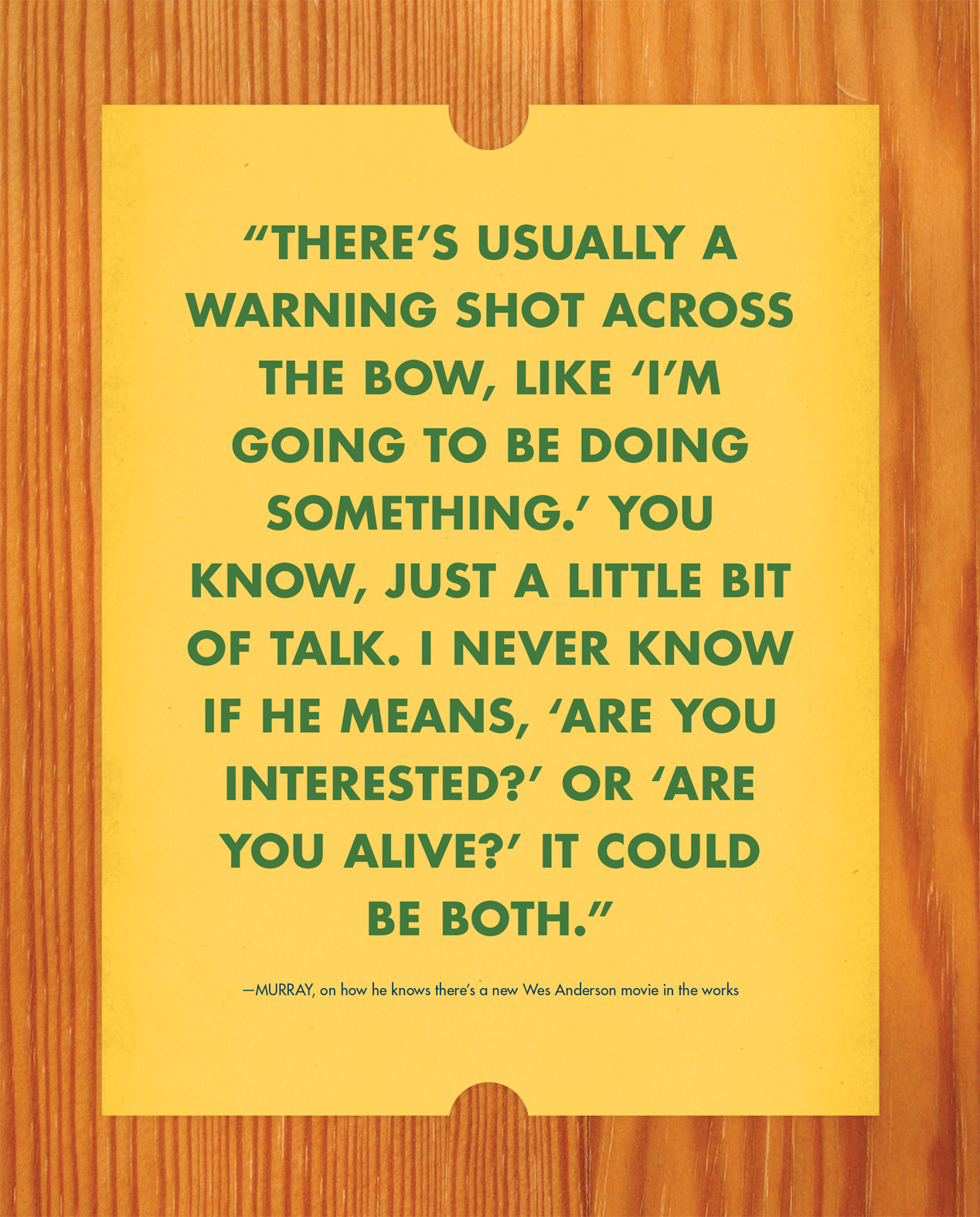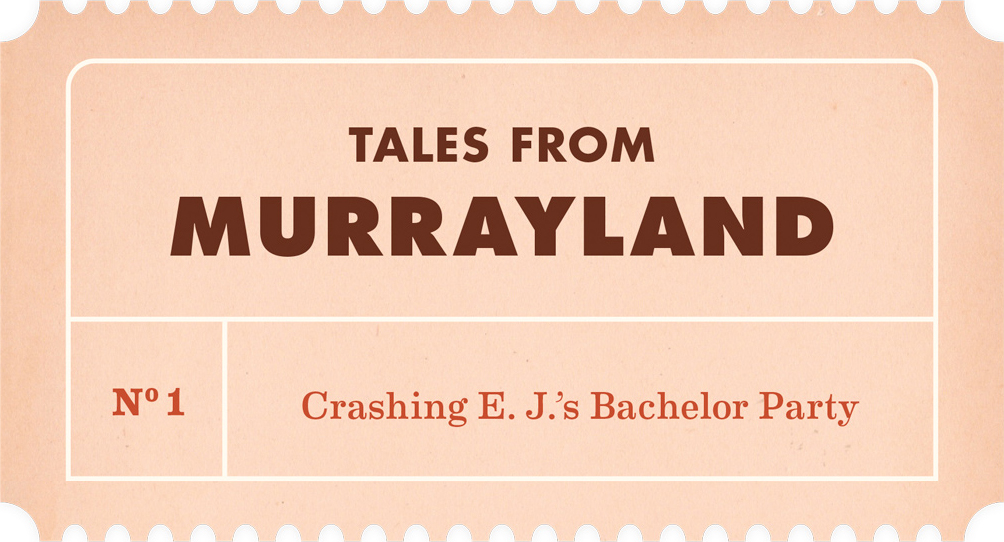
ABOUT LAST NIGHT
Murray was under consideration for the role of Danny Martin, the restaurant-supply salesman played by Rob Lowe, in this 1986 big-screen adaptation of David Mamet’s play Sexual Perversity in Chicago. At various points in the development process, John Belushi and Nick Nolte were to costar as Danny’s friend Bernie Litgo. That part went to James Belushi, who had played the character on stage. Negotiations with Murray apparently broke down after a disastrous meeting between Murray and Nolte in New York.
ACADEMY AWARDS
At the seventy-sixth Academy Awards ceremony in 2004, Murray was the odds-on favorite to win the Oscar for best actor for his work in Lost in Translation. But he lost to Sean Penn of Mystic River. When Penn’s name was announced, cameras caught a visibly disappointed Murray frowning in disgust at his table. “Pissed off? You bet I was,” he later admitted. “I don’t approve of award ceremonies, so I was wondering what had persuaded me to attend that one. I was pissed at myself.”
“I FEEL THAT IF YOU REALLY WANT AN OSCAR, YOU’RE IN TROUBLE. IT’S LIKE WANTING TO BE MARRIED—YOU’LL TAKE ANYBODY.”
The best actor loss was just the latest item in a dossier of Oscar snubs Murray had been compiling since the mid-1990s. “Comedy never gets the Oscar,” he groused. “Groundhog Day was one of the greatest scripts ever written. It didn’t even get nominated for an Academy Award. And a movie called Dave won, which was a rehash of a movie about a Spanish dictator who died and had an actor replace him. How can that be the best original screenplay? Laughter and the lighter moments of life always seem easy to deliver. I don’t expect those giving out the awards to understand.” (In fact, Dave—directed by Murray’s old Ghostbusters collaborator Ivan Reitman—did not win the Oscar for best original screenplay in 1993. The Piano did. But it’s true that Groundhog Day was passed over.)
Justified or not, Murray’s loss deprived television viewers of the chance to hear one of the most original and insouciant acceptance speeches in Oscars history. As Murray told PBS talk show host Charlie Rose in a 2014 interview: “I was going to say, ‘When I heard I’d been nominated with,’ you know I’d name these other people [Sean Penn, Ben Kingsley, Johnny Depp, and Jude Law], ‘I really thought I had a pretty good chance.’ I just thought no one had ever given that speech… . I didn’t have agents, I didn’t have managers, I didn’t have any of that stuff. So I wouldn’t have to give that ordinary speech of thanking everyone. I’d just go out there and entertain. I always figure, if you’re on a TV show where there’s a billion people, show up and do something, okay? Give those folks in Bombay something to talk about.”
It took nearly half a year for Murray to recover from the shock of hearing Sean Penn’s name being called instead of his own. About six months later, he said, “I realized I’d come down with something. That prize-winning stuff. I’d sort of had a low-grade infection of liking winning the prize and wanting to win the prize. I thought, oh, good. You’ve seen when people do win the prize, and then for the next couple of years they really struggle. Because they’re sort of stuck. ‘Hey, I’m an Academy Award winner. And now what do I want to do?’ They get all messed up. And that could have happened to me.” In recent years, Murray has taken solace knowing that many people think he actually did win the Oscar for Lost in Translation. “I never try to say, ‘No, that isn’t true.’ I just say, ‘You’re so kind.’”
AGENTS
Murray is famously disdainful of professional representation. In 2000, he fired his agents—reportedly for calling him on the phone too often—and replaced them with an automated 800 number. “I said I didn’t ever want to speak to them again, and I never did,” he says. “I like to cut my own lawn now. I don’t need a landscaper.”
Filmmakers who wish to pitch projects to Murray must leave a message on his voice mailbox, which he rarely checks. When he is interested in a script, Murray demands that it be faxed to him care of his local office supply store. This unique arrangement has resulted in Murray missing out on a number of high-profile job offers, including the roles of Willy Wonka in Charlie and the Chocolate Factory, Frank Ginsberg in Little Miss Sunshine, and the title role in Bad Santa. “We wanted Bill to consider a role in Iron Man, but nobody could find him,” observed Robert Downey Jr.
When asked to explain his decision to represent himself, Murray will often cite a quote attributed to actress Ellen Burstyn: “I had a dream that I was being drowned in a flood and I realized it was a flood of people.” According to Murray: “When you have an agent, the phone rings all the time because there’s someone there whose job it is to get so-and-so on the phone, and so they dial the number, and they’ll let it ring seventy-five times. You can be in your house and be like, ‘I’m not answering that phone …’ and all you can really think is, ‘I really don’t want to meet the person that lets a phone ring like that.’”
AGING
Murray began making the transition to dramatic roles in his late forties, in part because of fears that his comedic prowess would diminish with age. “As you get older, you have less chance to be funny,” he once declared. “That’s where most comedians lose it. Very few make it all the way to the end, like Jack Benny or George Burns.” During a 2014 press junket to promote St. Vincent, Murray mused on what the end stage of his career might look like. It involved graduating to insect roles. “If I keep living, I will probably play a grasshopper someday,” he said. “Hopefully there’s some kid someday who played with grasshoppers as a kid and will write a script about it and cast me.”
AIR AMERICA
Murray was filmmaker Richard Rush’s first choice to play the role of Billy Covington in this 1990 comedy about a hotshot helicopter pilot who takes a job flying covert missions for the CIA during the Vietnam War. Sean Connery was originally tapped to play Covington’s wizened mentor, Gene Ryack. After Rush was ousted as director, the film was retooled as a vehicle for Robert Downey Jr. and Mel Gibson.
AIRPLANE!
Murray turned down an offer to play the lead role of Ted Striker in this 1980 comedy from the creative team of Jim Abrahams, Jerry Zucker, and David Zucker. The part, which David Letterman also declined, eventually went to Robert Hays. Murray later cited Airplane! as an example of a movie that he passed on even though he knew it would be successful.
“THIS IS GONNA WORK, BUT IT’S NOT FOR ME.”
ALL YOU NEED IS CASH
Murray has a scenery-chewing cameo in this 1978 TV mockumentary chronicling the career of the Rutles, a fictitious British pop band modeled on the Beatles. His character, bellowing radio deejay “Bill Murray the K,” is loosely based on self-proclaimed “Fifth Beatle” Murray Kaufman, aka “Murray the K.” Also known as The Rutles, All You Need Is Cash was expanded from a sketch that originally aired on the BBC program Rutland Weekend Television in 1975. Excerpts from that skit were shown on the October 2, 1976, episode of Saturday Night Live, hosted by Monty Python veteran and Rutles cocreator Eric Idle. A number of SNL cast members from the period, including Dan Aykroyd and John Belushi, also have cameos in the film.
ALPHA HOUSE
Since 2013, Murray has had a recurring cameo on this Amazon Original comedy series from Doonesbury creator Garry Trudeau. He plays Vernon Smits, a U.S. senator imprisoned for unspecified improprieties at an amusement park. Trudeau was able to snag Murray for the role through the good offices of his wife, former Today show anchor Jane Pauley, whom Murray had befriended around the NBC craft services table during his days on Saturday Night Live.
ALVIN AND THE CHIPMUNKS
Murray turned down the role of David Seville in this dreadful 2006 film based on the screeching cartoon musical group of the 1950s. Jason Lee eventually took on the burden of playing the chipmunks’ beleaguered human companion.
ANDERSON, WES

Texas-born film director in whose unofficial repertory company Murray enlisted in the late 1990s. To date, Murray has appeared in all but one of Anderson’s eight increasingly idiosyncratic features, and he would have been offered a role in the eighth—1996’s Bottle Rocket—had he bothered to answer the director’s phone calls. Judging from his public comments, it’s safe to say Anderson tops the list of filmmakers with whom Murray most enjoys working. “I really love the way Wes writes with his collaborators,” Murray has said. “I like the way he shoots, and I like him. I’ve become so fond of him. I love the way that he has made his art his life. And you know, it’s a lesson to all of us, to take what you love and make it the way you live your life, and that way you bring love into the world.” Anderson was among the first to exploit Murray’s potential for pathos on film, beginning with 1998’s Rushmore. After several years spent flailing in lowbrow comedies like Larger Than Life and The Man Who Knew Too Little, Murray welcomed the chance to stretch his acting muscles. Of Anderson’s approach to using him, he once observed: “Wes really knows what he wants. It’s not like, ‘Get the ham out there and let him oink.’”

ARMAGNAC
Aromatic French brandy favored by Murray in his mid-twenties. He has referred to Armagnac as “truth serum.” Murray and his Stripes costar Warren Oates got falling-down drunk on Armagnac during a 1980 visit to the grave of character actor Strother Martin.
ARTHUR, BEA
The legendary star of Maude and The Golden Girls met Murray when she hosted the November 17, 1979, episode of Saturday Night Live. In a 2008 interview with film critic Elvis Mitchell, Murray confessed that he did not look forward to working with Arthur, considering her an “old dame” whose antiquated, declamatory acting style wouldn’t mesh with his more improvisational approach. “I wouldn’t have thought I’d give a hoot and holler about Bea Arthur,” he said. But she won him over with her commitment to her performance. “I was very impressed with her,” he admitted. “She was amazingly professional. She was game. She had all kinds of chops and could do anything.”
ASSASSINATION
In a 2014 interview, Murray revealed the reason he does not surround himself with an entourage as other celebrities do: fear of assassination. “The first time I was ever given a bodyguard, I thought, ‘Oh, my God, I’m going to be assassinated,’ he told the Detroit Free Press. “It made me think I was going to be shot. So I never liked it. I never liked the sensation of it.”
AUTOGRAPHS
Murray hates signing autographs. Besieged by autograph seekers during dinner with a magazine interviewer in 1989, he reacted angrily, calling the imposition “an assault.” “Why do some people want your autograph when it’s plain that they don’t give a shit about you?” he complained. “At least let a guy finish his dinner. Sometimes I feel people think, ‘What the hell, this bum is getting all that dough—let’s make him earn it.’”
When he does give in, Murray has been known to append slyly menacing notes for his fans. One six-year-old who requested his signature at the height of Ghostbusters mania was greeted with the message: “Sidney, run away from home tonight—Bill Murray.” At other times, Murray has made a point of signing Jim Belushi’s name instead of his own. During a vacation in Mexico in 1988, Murray was pestered by one “overdressed” female fan who “kept ordering me to give her autographs … like I was her personal trinket.” He responded by dumping the woman—“furs, designer clothes, and all”—into a swimming pool.
AWAKENINGS
Director Penny Marshall considered Murray for the role of catatonic Leonard Lowe in this 1990 film based on the casebook of neurologist Oliver Sacks. But with Robin Williams on board as a fictionalized version of Sacks, Marshall was reluctant to add another comic actor to the cast. Robert De Niro took the part and received an Academy Award nomination for best actor. Murray went on to play a bearded neurologist, loosely based on Oliver Sacks, in 2001’s The Royal Tenenbaums.
AWARDS
Over his long career, Murray has amassed numerous acting prizes and nominations, including an Emmy for outstanding writing on Saturday Night Live and a Golden Globe for best actor in a musical orcomedy for Lost in Translation. In 2004, he was famously passed over for an Academy Award for best actor in favor of Sean Penn. He is one of only a handful of actors to be nominated for both the Oscar and its Canadian cousin, the Genie Award. Despite all the accolades he’s received, Murray has a professed aversion for the pursuit of awards, a desire he once likened to a “low-grade infection.”
See also Academy Awards.
“AWARDS ARE MEANINGLESS TO ME AND I HAVE NOTHING BUT DISDAIN FOR ANYONE WHO ACTIVELY CAMPAIGNS TO GET ONE.”
AYKROYD, DAN
Web-footed, heterochromic Canadian comic actor whom Murray credits with being one of the only people to write sketches for him during his difficult first season on Saturday Night Live. A gifted impressionist and character actor, Aykroyd collaborated with Murray on two Ghostbusters films and helped grease the wheels for the greenlighting of Murray’s magnum opus, The Razor’s Edge, in 1984. Both men also had small roles in Mr. Mike’s Mondo Video, All You Need Is Cash, and Nothing Lasts Forever. Murray has called Aykroyd “a hell of a guy” and once claimed he was the only one of the ex-ghostbusters with whom he socialized regularly. Despite their longstanding friendship, Murray has resisted all of Aykroyd’s entreaties to join him in a proposed third Ghostbusters movie.

On Memorial Day weekend in 2014, Murray was dining with friends at Oak Steakhouse in Charleston, South Carolina, when a group of revelers from Washington, D.C., real estate developer E. J. Rumpke’s bachelor party asked if he would join them upstairs and say a few words to the groom-to-be. After initially declining, Murray ambled on up to the restaurant’s second floor and began dishing out relationship advice to the assembled partygoers. “You know how funerals are not for the dead, they’re for the living?” Murray told an astonished Rumpke and twenty of his Boston College buddies. “Bachelor parties are not for the groom, they’re for the unmarried.” He then shared his secret for finding your soul mate:
“If you have someone that you think is the One, don’t just sort of think in your ordinary mind, ‘Okay, let’s make a date. Let’s plan this and make a party and get married.’ Take that person and travel around the world. Buy a plane ticket for the two of you to travel all around the world, and go to places that are hard to go to and hard to get out of. And if when you come back to JFK, when you land in JFK, and you’re still in love with that person, get married at the airport.”